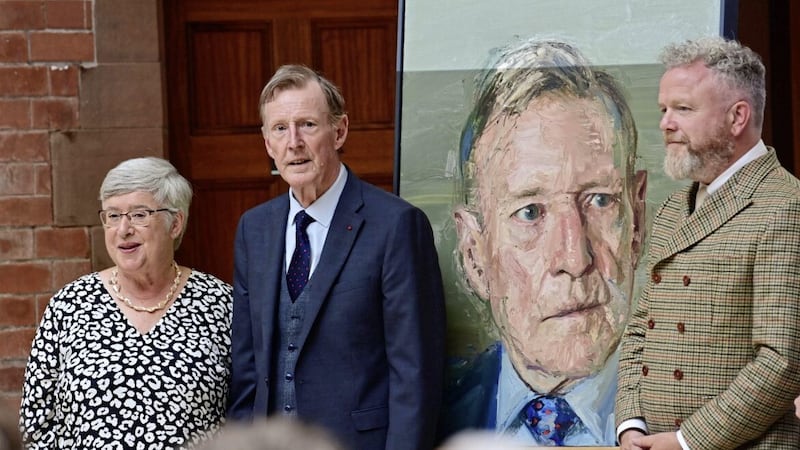I suspect no-one would have been more surprised at the plaudits for David Trimble following his death than the man himself.
He was not quite forgotten, but the House of Lords has a habit of making great statesmen an irrelevance; and, with each succeeding anniversary, there was a sense that his contribution to the peace process had been written out of history.
The electoral opportunism of the DUP, the baiting, the cries of ‘Lundy’, meant he was never really able to champion his greatest achievement.
Well, you cannot say he’s lost his place in history now. Political friends and foes alike have been generous in their praise for his true grit and tenacity in the talks, and in the subsequent campaign to sell the deal. That it has taken his death for the spotlight to shine on his remarkable career is a shame.
But he lived long enough to see his portrait hung in the Great Hall at Queen’s, alongside some of the greats of the law, sciences, arts and politics. That must have been a comfort to him and his family.
The challenges facing Trimble as he sat around the negotiating table were great – greater perhaps than those facing the nationalist side. Hume and Adams were surfing the tide of history.
With Trimble, there was always the sense that he was being forced to swim against the tide to get to his destination.
It says a lot about the man that he made it – with no thanks to some in his own party or the malevolent leadership of the DUP whose strategy was to sit back and let him do the hard work.
He was my constituency MP, and I voted for him in the 2005 election he was doomed to lose because his own people had been turned against him. My tactical vote was futile.
History is riddled with visionaries who never quite made it to the ‘holy land’. But Trimble came close.
He deserved his election as First Minister of Northern Ireland, alongside Seamus Mallon – another politician who did not fit the populist caricature.
They were as odd a couple as the ‘Chuckle Brothers’ who followed them. But both were principled, and prepared to speak uncomfortable truths.
What united them – indeed what united all those who believed there was a better way than division – was a fundamental belief that the use of violence for political ends was wrong.
Somewhere there is a parallel universe where unionism fully embraced Trimble’s lead, and where the uneasy beginnings of partnership government flourished. It is a disgrace that we were robbed of that opportunity here to build a new society.
This week, those who made Trimble’s life a misery should hang their heads in shame. And they should get back to the Assembly.
The Trimble we never really saw was the author of the letter to an ill Martin McGuinness: “I will never forget the truly historic first meeting of the Executive and how we approached that seriously and in good humour, marred only by the absence of two ministers. I think that that even-tempered manner was characteristic of all your time in office.”
Trimble’s journey was the classic one of many unionist leaders – from hard man (he was a member of Bill Craig’s Vanguard party and a Sunningdale wrecker) to peacemaker, and then rejection by those whose cause he had advanced.
Unlike Brian Faulkner, however, whose trajectory his mirrors most, Trimble’s contribution to Northern Ireland was significantly greater. The talks that led to the Good Friday Agreement were seismic. Sunningdale was a step. But the Agreement was a paradigm shift.
Battered and tattered though it is, that Agreement has transformed our politics – even the DUP has been forced to operate within its confines.
We would not have had a generation of relative peace without it, and we would not have had the Agreement without Trimble. The Nobel Prize was deserved. For all his faults, he was a politician motivated by a sense of public service. The RHI scandal, for example, would not have happened on his watch.
It is almost obligatory to question the motives of politicians. But it is worth reflecting on the personal price paid by many whose energies were sapped in the peace process: John Hume, David Trimble, Martin McGuinness, Mo Mowlam and David Ervine.
It is also worth remembering two remarkable women who played as big a part as their husbands in the search for peace. Pat Hume and Daphne Trimble. May he rest in peace.








